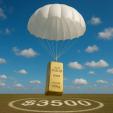Dollar Little Changed Despite Weak Economic Data
Washington (Jan 14) The dollar is little changed against its major competitors Wednesday afternoon after a volatile day of trading. The US currency came under pressure following the release of some disappointing economic reports, but has since recovered some ground. The release of the Beige book this afternoon has had little impact.
The Commerce Department released a report on Wednesday showing that US retail sales fell by much more than anticipated in the month of December. Retail sales slumped by 0.9% in December, while economists had expected sales to edge down by just 0.1%.
Import prices in the US showed another substantial decrease in the month of December, the Labor Department revealed in a report on Wednesday, with fuel prices leading the way lower once again. The Labor Department said its import price index plummeted by 2.5% in December after tumbling by a revised 1.8% in November. Economists had expected import prices to slump by 2.7%.
Additionally, the report said export prices fell by 1.2% in December following a 0.8% drop in November. Export prices had been expected to fall by 0.5%.
With an increase in wholesale inventories partly offset by a drop in retail inventories, the Commerce Department released a report on Wednesday showing that US business inventories rose by slightly less than expected in November.
The report said business inventories edged up by 0.2% in November, matching the modest increase seen in October. Economists had expected inventories to rise by about 0.3%.
Demand for US mortgages soared last week to the highest level in more than six years as 30-year rates dropped below 4%, according to the Mortgage Bankers Association . The MBA's seasonally adjusted index of mortgage application activity, which includes both refinancing and home purchase demand, jumped 49.1% in the week ended January 9 .
Fixed 30-year mortgage rates dropped to 3.89% from just above 4% the week before. Both refinancing and home purchase applications were up sharply as buyers looked to lock in these extremely attractive rates.
The US economy continued to expand at a "modest" or "moderate" pace in the final weeks of 2014, according to the Federal Reserve's latest Beige Book. Most respondents expect somewhat faster growth over the coming months.
Despite an uptick in developing countries and strong momentum in the US, the World Bank downgraded its global economic forecast citing weak prospects for the euro area and Japan .
In its biannual report 'Global Economic Prospects' released Tuesday, the World Bank said global gross domestic product is expected to grow 3% in 2015, slower than the 3.4% estimated in June.
According to the World Bank , downside risks to the outlook are persistently weak global trade, possibility of financial market volatility, the extent to which low oil prices strain balance sheets in oil producing countries, and the risk of a prolonged period of stagnation or deflation in the euro area or Japan .
An earlier bond-buying programme announced by the European Central Bank won a crucial legal backing from the top EU court on Wednesday, fueling speculation that the central bank may opt for full blown quantitative easing as early as its January 22 meeting, which could include government debt purchases, as it battles the threat of deflation in the euro area.
The dollar rose to a high of USD1.1727 against the Euro Wednesday morning, but pulled back to a low of USD1.1846 after the release of the disappointing economic data. The US currency is currently trading around the USD1.1780 level, nearly unchanged for the day.
Eurozone industrial production increased for the third consecutive month in November, Eurostat reported Wednesday. Industrial production rose 0.2% in November from October when it was up by revised 0.3%. The October figure was revised up from 0.1%. Economists had forecast output to remain flat.
The buck dropped to over a 1-week low of USD1.5269 against the pound sterling today, but has since bounced back to around USD1.5225 .
The leading economic index in the UK , which measures the future economic activity, dropped for the third straight month in November, figures from the Conference Board showed Wednesday. The Conference Board leading economic index fell 0.3% in November, same as in both September and October.
The greenback fell to nearly a 1-month low of Y116.071 against the Japanese Yen Wednesday morning, but has since rebounded to around Y117.330 .
The M2 money stock in Japan climbed 3.6% on year in December, the Bank of Japan said on Wednesday - worth 893.9 trillion yen . That was in line with expectations and unchanged from November.
Source: Alliance










